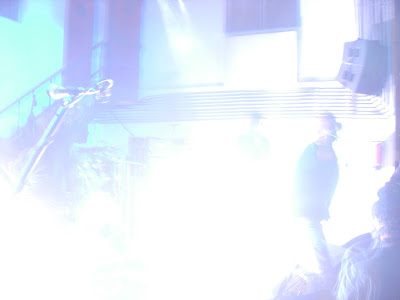Pentagram is a band that consists of Vishal, Randolph, Papal and Shiraz. It's a name that has faithfully stuck with the
nation’s 90’s child. The Alternative act from Bombay began, like most others,
as an Indian adaptation of bands like Pearl Jam and Alice In Chains, but
managed to push through newer styles, while still managing to retain the energy
and flavor that they started with. Energy, for one, has a lot to do with the
reason why they’re such an effective live act to date.
“You can tell at the beginning of a show how it’s going to go from there,” says Vishal Dadlani, crowd-puller and singer of Pentagram as they wind down ‘Think Of Me,’ from their 2002 album, ‘Up.’ “This seems to be going well!” The crowd at CounterCulture is readily indicating just how well it’s going, screaming, singing louder and jumping higher- just the sort of treatment fit for legends. In our English indie music scene, they’ve earned that title.
Vishal is celebrating his birthday and the crowd sings for him. “Now get your motherfucking
birthday hands in the air,” he says and the
crowd gets into it. The band slips into ‘This Is For My People.’ The track
from the 2007 album ‘It’s OK, Its All Good,’ seems to mark a period in Pentagram’s
growth when, having found their optimal sound, they could focus on catchy material tailored for mass absorption.
 |
On ‘Nocturne,’ from their fourth album 'Bloodywood,' some traits stick out to help understand the music: Dadlani’s melodies are clear and his lyrics audible, unlike most of his counterparts in the country; Randolph’s guitar riffs are powerful and concise with just the right amount of repetition. On the anthemic ‘Voice,’ the microphone is handed around the crowd and everyone gets a chance to voice their song. “There are words that must be said and there are words that must be heard and that they’re not is really quite absurd.”
While the samples and synthesizer keep the guitar-centric material from stagnating, a major aspect of the show is just Dadlani’s stage presence and tireless enthusiasm. Built like a viking, when he jumps on the stage the whole crowd seems to feel compelled to follow. With appealing melodies and the instrumental output of a tight, metal band, Pentagram is easy to listen to and heavy without sounding like rigid noise. “Am I still feeding on the ignorance of others? Am I better than a four legged animal or is it the other way around?” The industrial levels of distortion, the electronic garnishing and some of the images in the words often recreate an experience not too far from Nine Inch Nails. “What I’ve got inside me, you’ve got too.”

“Was anyone in this room born in 1993?”
A young man named
Hari gets onstage
“He was born on the same year that we started playing.”
We
pause a moment to take this in. The applause breaks in again with genuine
appreciation.
Pentagram have come such a long way that it actually shows.



















